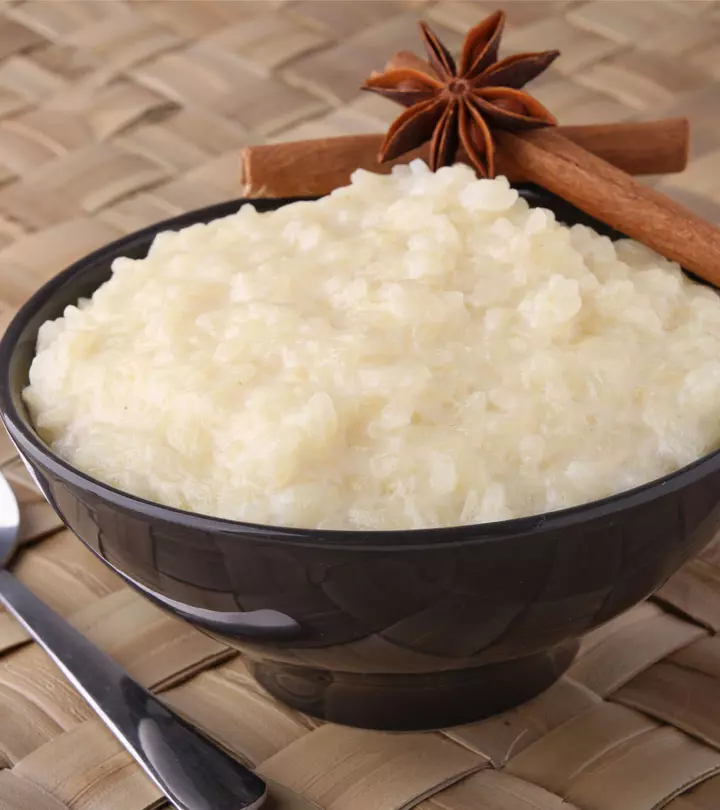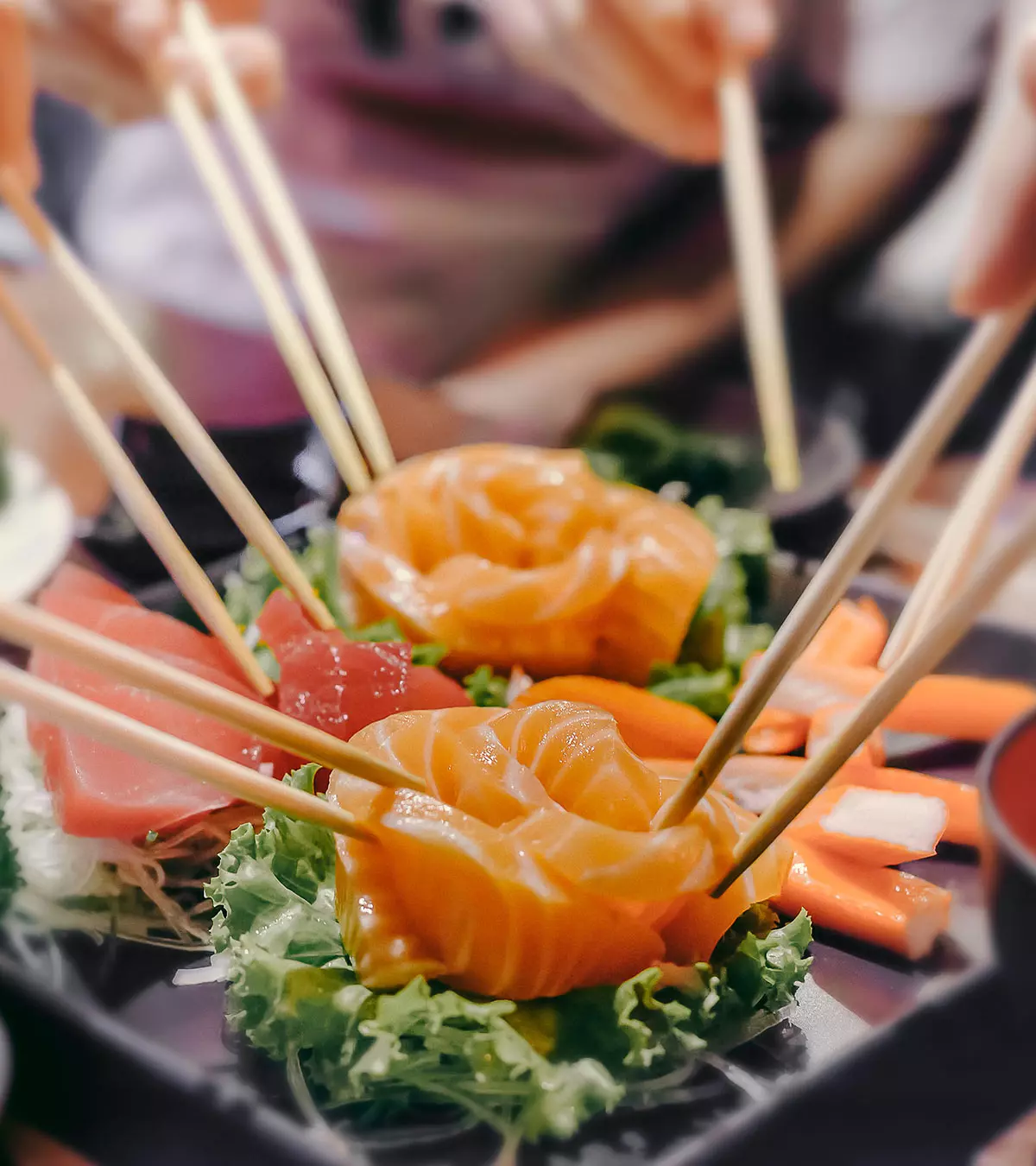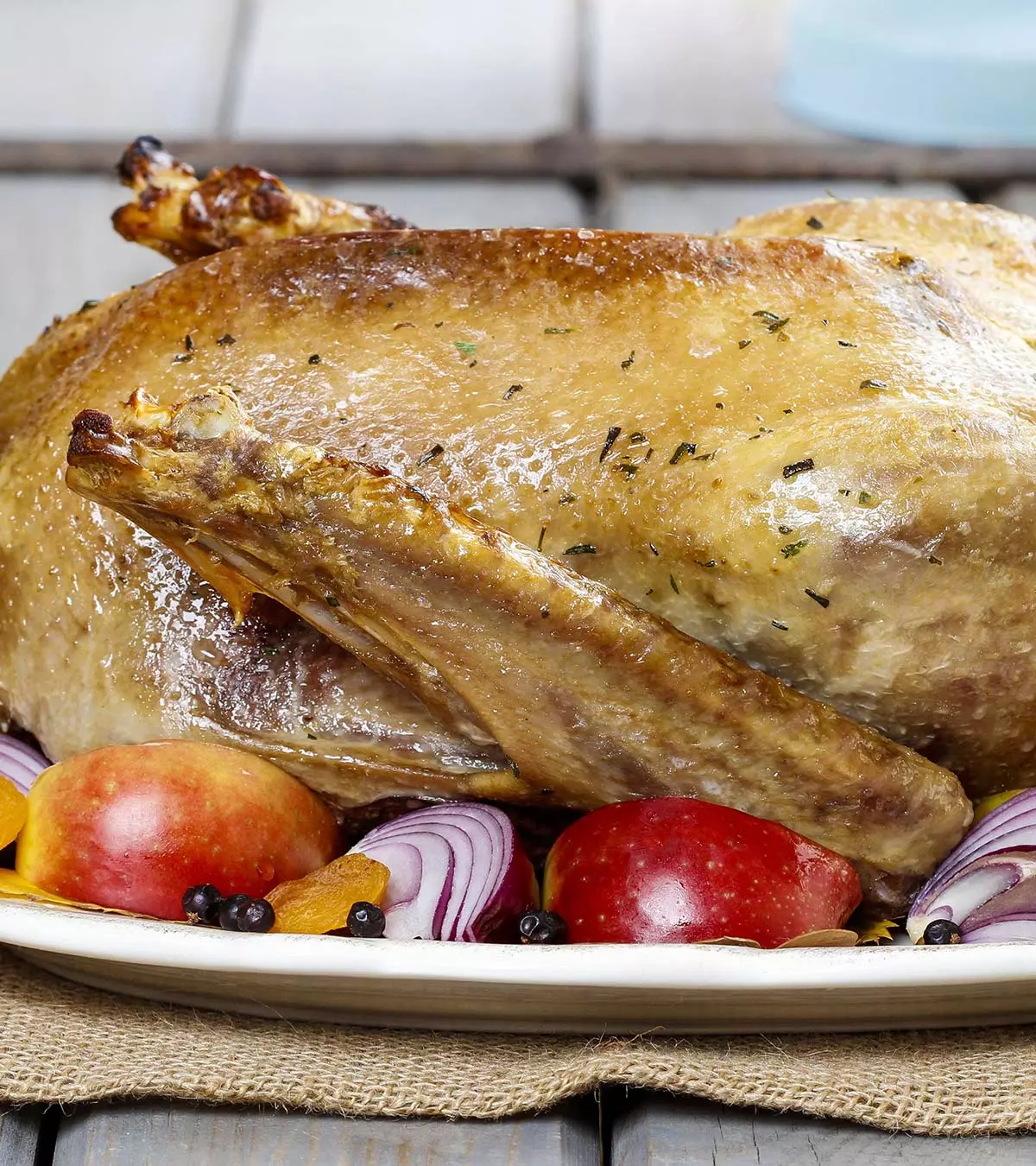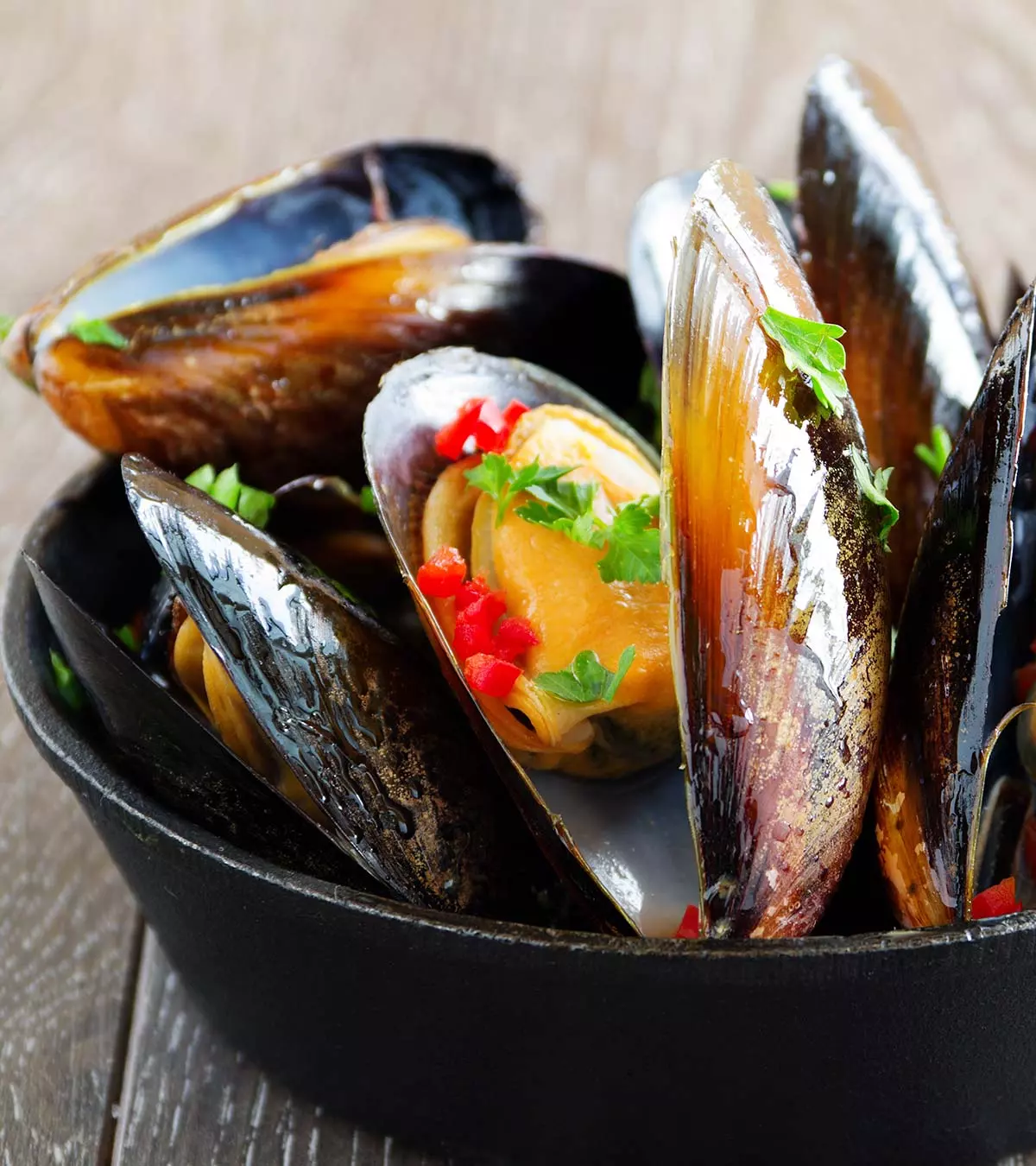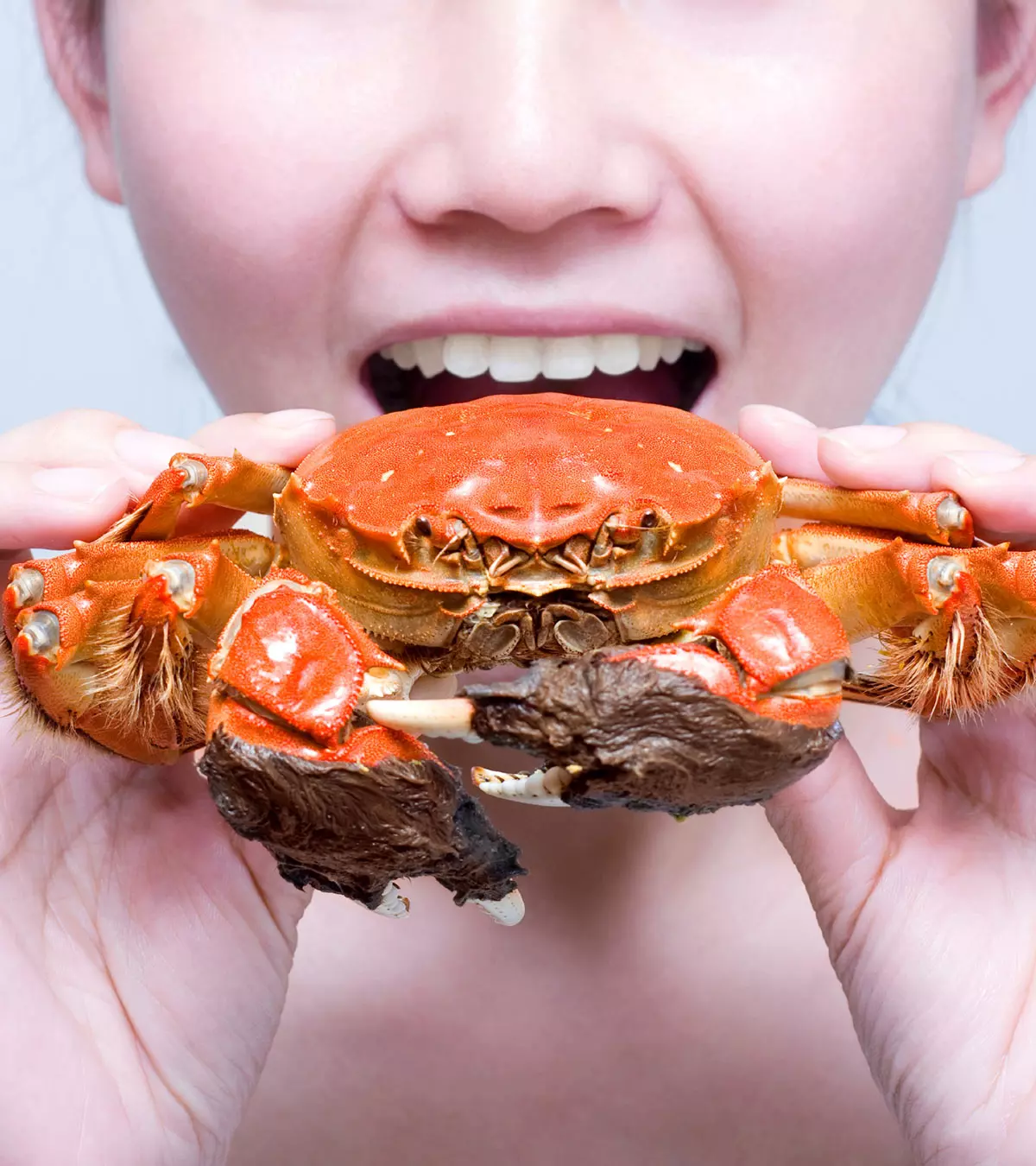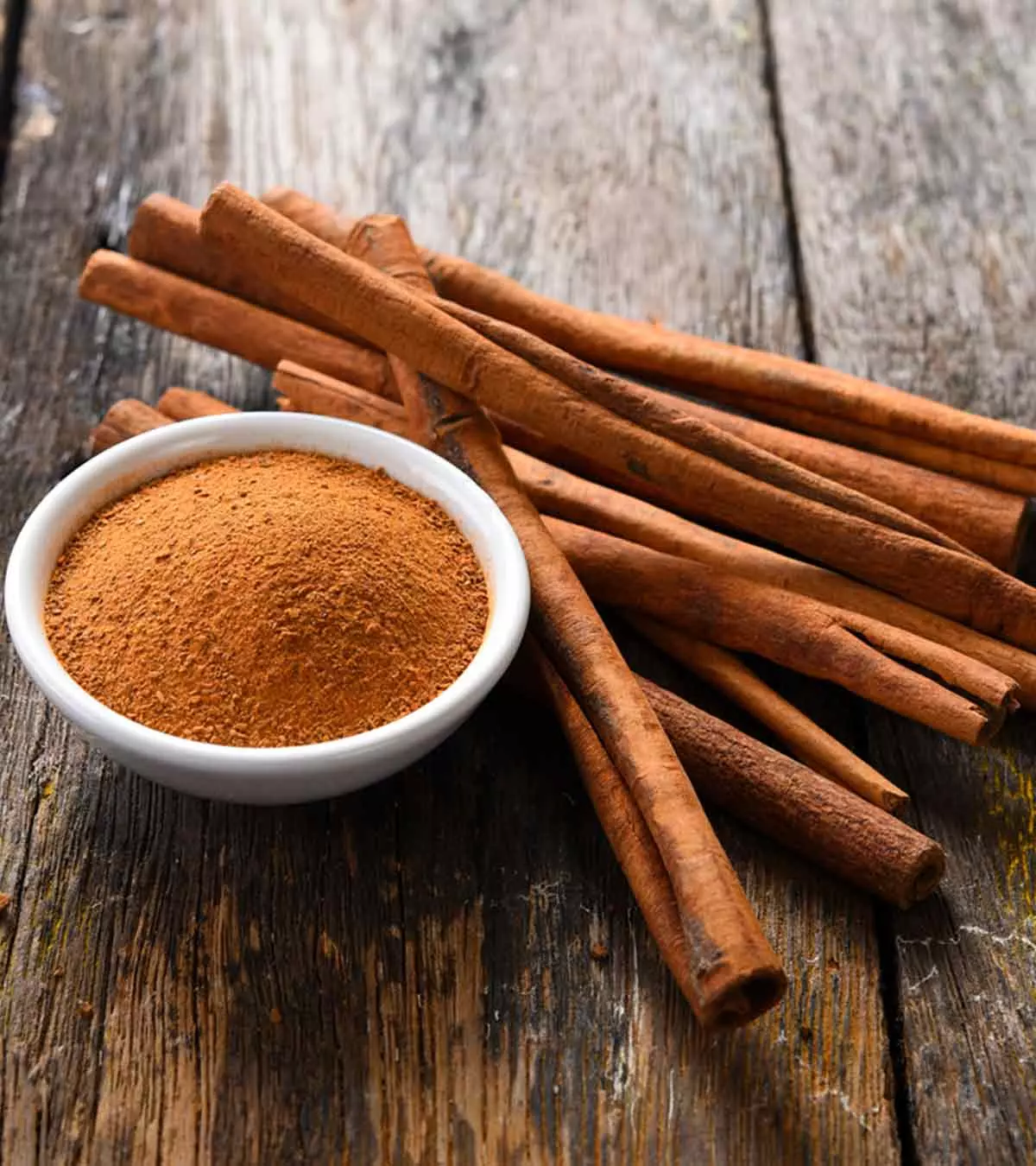
Image: Shutterstock
Cinnamon is a versatile medicinal plant that has various health benefits. Though it is beneficial for adults, the safety and benefits of cinnamon for babies should be considered before including it in their diet.

The bark of the cinnamon tree is the most commonly used part and is infused into many sweet and savory dishes as a spice. However, almost all of its parts, including the flowers, leaves, and roots, are edible and have therapeutic value.
Read this post to understand more about the safety, benefits, and adverse effects of cinnamon on babies and how to include it in their diet.
Key Pointers
- Cinnamon in limited amounts is considered safe for consumption in babies older than six months of age.
- It helps to improve immune and cognitive function, digestive health, and relieve pain in babies.
- If they are not allergic, you may add cinnamon to the baby’s diet as a seasoning or tempering agent.
Is Cinnamon Safe For Babies?
The U.S Food and Drug Administration considers cinnamon as “Generally Recognized As Safe” (GRAS) for consumption among babies (1). Anecdotal evidence suggests that one teaspoon of cinnamon powder a day should be safe to consume for babies who are at least six months old.
When Can Babies Have Cinnamon?

The American Academy of Pediatrics recommends using cinnamon for babies once they are six months of age (2). If you wish to introduce cinnamon before the age of six months, then consult your pediatrician.
 Be watchful
Be watchfulHealth Benefits Of Cinnamon For Babies
Several studies in animals and humans demonstrate that cinnamon can be helpful in boosting cognitive function (3) (4). Below are some probable health benefits that cinnamon can provide to babies.
- Immune function: Babies are more vulnerable to infections than older kids and adults. The use of cinnamon to support immunity has been a common practice in alternative medicine, especially for babies.
 Research finds
Research finds- Cognitive function: Cinnamon contains phytochemicalsiChemical substances produced by plants that help lower the risk of diseases and provide health benefits to the body. that boost the brain’s ability to utilize glucose (6). Adequate and prolonged use of cinnamon might help boost cognitive development among babies.

- Generalized pain: Cinnamon is believed to possess antioxidant and anti-inflammatory properties that could potentially help reduce soreness and pain. This property of cinnamon has made it a popular alternative medicine to treat dental problems (7). However, before using any home remedy, consult a pediatrician.
- Common cold and flu: The use of cinnamon to get some symptomatic relief from cold and flu is common in alternative medicine. A cup of cinnamon tea with one teaspoon of honey is considered as an effective treatment for cold (8). However, honey is not safe for babies below the age of 12 months (9).
- Digestive health: The use of cinnamon in traditional medicine to treat digestive issues is well documented. The common digestive ailments for which the use of cinnamon was recommended were indigestioniA common gastric disorder causing abdominal pain, bloating, or discomfort, especially after consuming food. , flatulenceiReleasing gas from the digestive tract through the back passage (rectum). , abdominal cramps, and intestinal spasmsiA condition marked by a sudden contraction of the muscles, causing pain in the abdominal region. (10). Anecdotal evidence reaffirms the effectiveness of cinnamon to provide symptomatic relief from the mentioned ailments. However, the safety of use for babies is not well researched.
- Dental Care: In traditional medicine, cinnamon oil has been used to treat various dental issues. This practice is now validated by some recent research studies that indicate that cinnamon might prove helpful in maintaining dental health (11) (12). However, the use of cinnamon for babies for oral care is a decision you should take in consultation with a pediatrician.
- Skin Care: Cinnamon oil is an essential oil believed to promote skin health. A recent research study has demonstrated that regular use of cinnamon oil has a soothing effect, effectively reducing skin inflammation (13). However, there are no research studies to validate the safety and efficacy of cinnamon oil in baby’s skin care.
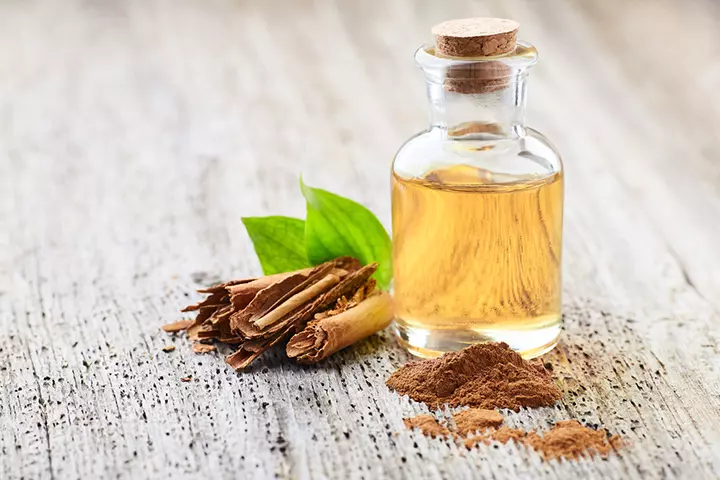
The use of cinnamon has also been attributed to the treatment of reduced appetite, diarrhea, and vomiting.However, its safety and efficacy as a treatment for any health problem in babies are not well-researched. It is essential to use caution while using the spice for the baby, especially if the baby is prone to allergies.
Cinnamon Allergy In Babies

Cinnamon allergy is possible, but it is not common. A basic non-allergic reaction to cinnamon is a local rash at the spot where cinnamon touches the skin.
According to child specialist Dr. Mubina Agboatwala, “If cinnamon is given after six months, it does not cause adverse reactions, but sometimes, if the baby has an allergic tendency, it can cause a skin reaction at the side of the mouth where the cinnamon touches and it becomes slightly red and itchy, or develop an eczematous patch. Likewise, if the cinnamon powder is inhaled in small quantities, it can cause coughing and sneezing.”
In general, the allergic antibody-mediated reactions in the case of cinnamon are believed to be very rare. Besides, oral consumption is known to show non-allergic reactions consistent with “intolerances” (14).
A few cases of cinnamon-induced mucosal contact reactions have been documented. The signs and symptoms of oral contact allergic reaction to cinnamon may mimic other common oral disorders, which makes its diagnosis quite difficult (15).
Therefore, it is crucial that you be aware of the products which might contain cinnamon, especially if your infant is diagnosed with cinnamon allergy. Below are some basic symptoms that you might observe due to allergy (16).
- Runny nose
- Difficulty in breathing or shortness of breath
- Red, sore, and watery eyes
- Vomiting or nausea
- Swelling of the lips or tongue
If you think your baby might have a cinnamon allergy, it’s best to consult your pediatrician for proper testing and advice.
Ways To Include Cinnamon In Your Baby’s Diet
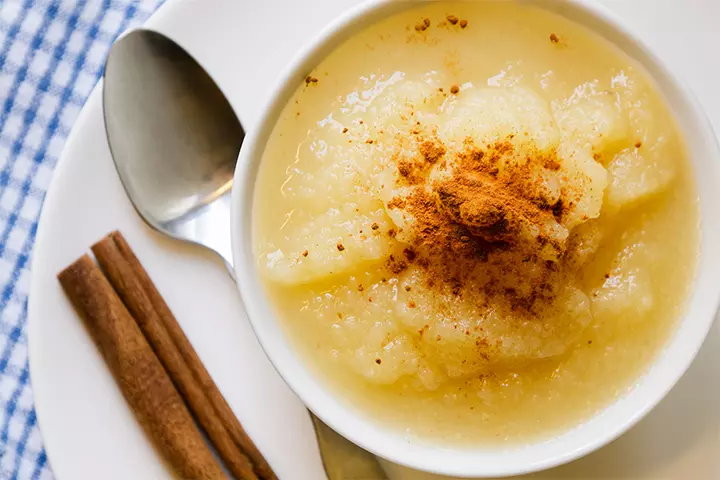
You can add cinnamon to your baby’s diet in various forms. It can be sprinkled over to a puree or breakfast cereal, like oatmeal, as a flavoring agent. Below are some foods in which you can add cinnamon for flavor.
- Applesauce
- Mashed sweet potato
- Carrot and pumpkin puree
- Oatmeal
- Quinoa
Cinnamon can also be added to foods such as eggs and fish once your baby begins to eat them.
A mom of two, Umaima is a blogger who makes healthy recipes for her children. She flavored her six-months-old’s apple puree with cinnamon in one of her baby food recipes and noted her reaction. She says, “Instead of adding cinnamon powder to the puree, I steamed the apple with a cinnamon stick. It ensured that only the lovely aroma of cinnamon penetrated the apple, lightly flavoring its flesh. Voila, Nabeel gulped the spiced cinnamon apple puree with gusto (i).”
 Did you know?
Did you know?Selection And Storage Of Cinnamon
Below are some points to keep in mind while buying and later storing the cinnamon at home (17).
- Buy cinnamon sticks or powder from reputed dealers, especially the ones with a proven record.
- Check for “manufacturing” or “to be used by” date. These dates are helpful for proper storage. However, they are reliable only if the food is kept at the mentioned temperature during storage and handling.
- The thickness of the sticks determines the quality of the spice. Basically, the thinner the cinnamon sticks, the better the quality (18).
- For household use, buy small quantities only, especially loose cinnamon powder, which loses flavor quickly.
- Keep the cinnamon packet away from heat, humidity, fluorescent lighting, and direct sun to preserve the cinnamon’s flavor and color.
- Once you have opened the packet, store the cinnamon within a tightly-shut container in a dry and cool environment. It will help avoid moisture and maintain freshness.
Frequently Asked Questions
1. What are the types of cinnamon most suitable for use?
Several varieties of cinnamon bark come from trees of various species from the Cinnamon genus (6). However, the two most used types are True cinnamon, also known as Ceylon cinnamon or Mexican cinnamon, and Cassia cinnamon, also known as Chinese cinnamon. According to a few studies, Cassia cinnamon can cause exposure to coumarin, a highly hepatotoxic and carcinogenic element found in it (19). Therefore, it is wise to buy certified true cinnamon for babies.
2. Is cinnamon good for teething babies?
Cinnamon has anti-inflammatory properties that help in reducing inflammation. This property of cinnamon can prove useful during your baby’s teething, as teething makes gums swell due to inflammation. Nevertheless, no clinical indications support the use of cinnamon during teething.
3. Can we give cinnamon water to babies?
Cinnamon water can be given to babies. However, the amount of cinnamon added to water must be monitored carefully. As per the US FDA, oral intake of one to six grams of cinnamon per day is considered safe for adults (20). However, there is no safe limit marked for babies. Therefore, consult your pediatrician about the safe limit.
4. Does cinnamon cause constipation?
Cinnamon is generally considered safe for babies, but consuming large amounts for a prolonged time can cause some adverse effects, such as stomach discomfort (21). Therefore, it is best to speak with a pediatrician to determine the appropriate dosage for your baby based on their age.
Cinnamon is one of the many aromatic and flavourful spices that holds many medicinal properties. Due to its wide range of health benefits, such as improved digestion, immunity, and dental care, you can include cinnamon for babies as part of their diet. Choose verified products from reputed vendors and start with a moderate amount. If your baby doesn’t show any adverse reactions after the first few feeds, you may safely continue to include cinnamon in their meals for a different and tingling taste.
Infographic: Recipes With Cinnamon For Babies
After knowing about the benefits of cinnamon for your baby, you might be wondering how you can include this spice in their diet. In the following infographic, we have included a few baby-friendly recipes that include cinnamon and will bring a change of taste to your baby’s palette. So, read on and save it so you can also try making the recipes later.
Some thing wrong with infographic shortcode. please verify shortcode syntax
Illustration: Amazing Health Benefits Of Cinnamon For Babies

Image: Dall·E/MomJunction Design Team
Learn how to create nutritious Apple and Cinnamon Super Breakfast Muffins, perfect for baby-led weaning. Discover the recipe for these delicious and wholesome treats to nourish your little one.
Personal Experience: Source
MomJunction articles include first-hand experiences to provide you with better insights through real-life narratives. Here are the sources of personal accounts referenced in this article.
i. Baby Food 0 To 9 Months; Steamed Apple Recipe – Baby Food.https://beingamommyblog.wordpress.com/2014/08/07/steamed-apple-recipe-baby-food/
References
- CFR – Code of Federal Regulations Title 21.
https://www.accessdata.fda.gov/scripts/cdrh/cfdocs/cfCFR/CFRSearch.cfm?CFRPart=582&showFR=1 - Easing Infants & Toddlers into Halloween Fun: Tips from the AAP.
https://bgcc.tamu.edu/wp-content/uploads/2019/10/October-2019-Newsletter-1.pdf - Priyanga Ranasinghe et al.; (2013); Medicinal properties of ‘true’ cinnamon (Cinnamomum zeylanicum): a systematic review.
https://www.ncbi.nlm.nih.gov/pmc/articles/PMC3854496/ - Gruenwald J et al.; (2010); Cinnamon and health.
https://pubmed.ncbi.nlm.nih.gov/20924865/ - Franziska Roth-Walter et al.; (2014); Immune Suppressive Effect of Cinnamaldehyde Due to Inhibition of Proliferation and Induction of Apoptosis in Immune Cells: Implications in Cancer.
https://www.ncbi.nlm.nih.gov/pmc/articles/PMC4182734/ - Pallavi Kawatra and Rathai Rajagopalan; (2015); Cinnamon: Mystic powers of a minute ingredient.
https://www.ncbi.nlm.nih.gov/pmc/articles/PMC4466762/ - Hamid Mollazadeh and Hossein Hosseinzadeh; (2016); Cinnamon effects on metabolic syndrome: a review based on its mechanisms.
https://www.ncbi.nlm.nih.gov/pmc/articles/PMC5220230/ - Natural cold and flu remedies from around the world.
https://www.worldvision.org/health-news-stories/natural-cold-flu-remedies-world - Botulism.
https://www.healthdirect.gov.au/botulism - Rafie Hamidpour et al.; (2015); Cinnamon from the selection of traditional applications to its novel effects on the inhibition of angiogenesis in cancer cells and prevention of Alzheimer’s disease and a series of functions.
https://www.ncbi.nlm.nih.gov/pmc/articles/PMC4488098/ - Wiwattanarattanabut K et al.; (2017); In Vitro Anti-Cariogenic Plaque Effects of Essential Oils Extracted from Culinary Herbs.
https://www.ncbi.nlm.nih.gov/pubmed/29207708 - Devanand Gupta and Ankita Jain.; (2015); Effect of Cinnamon Extract and Chlorhexidine Gluconate (0.2%) on the Clinical Level of Dental Plaque and Gingival Health: A 4-Week Triple-Blind Randomized Controlled Trial.
https://www.ncbi.nlm.nih.gov/pubmed/26373226 - Xuesheng Han and Tory L. Parker; (2017); Anti Inflammatory Activity of Cinnamon (Cinnamomum zeylanicum) Bark Essential Oil in a Human Skin Disease Model.
https://www.ncbi.nlm.nih.gov/pmc/articles/PMC5518441/ - Can Spices Cause Allergic Reactions?
https://www.aaaai.org/tools-for-the-public/conditions-library/allergies/can-spices-cause-allergic-reactions - Ana P. M Vivas and Dante A Migliari; (2015); Cinnamon-induced Oral Mucosal Contact Reaction
https://www.ncbi.nlm.nih.gov/pmc/articles/PMC5518441/ - Cinnamon Allergy.
https://allergykb.org/cinnamon-allergy/ - Food Storage for Safety and Quality.
https://nasdonline.org/2082/d000066/food-storage-for-safety-and-quality.html - Cinnamon.
https://www.tis-gdv.de/tis_e/ware/gewuerze/zimt/zimt.htm - Yan-Hong Wang et al.; (2013); Cassia Cinnamon as a Source of Coumarin in Cinnamon-Flavored Food and Food Supplements in the United States.
https://www.researchgate.net/publication/236579505_Cassia_Cinnamon_as_a_Source_of_Coumarin_in_Cinnamon-Flavored_Food_and_Food_Supplements_in_the_United_States - Is Cinnamon Good For You?
https://thewholeu.uw.edu/2016/03/03/is-cinnamon-good-for-you/ - Mahdie Hajimonfarednejad et al., (2019); Cinnamon: A systematic review of adverse events.
https://pubmed.ncbi.nlm.nih.gov/29661513/ - Cinnamon.
https://nutritionfacts.org/topics/cinnamon/ - Is the ”Cinnamon Challenge” Dangerous?
https://www.childrensmn.org/educationmaterials/parents/article/14035/is-the-cinnamon-challenge-dangerous/
Community Experiences
Join the conversation and become a part of our nurturing community! Share your stories, experiences, and insights to connect with fellow parents.
Read full bio of Jyoti Benjamin
- Dr. Mubina Agboatwalla is the head of the department of pediatrics at Karachi Liaquat Hospital, Pakistan. She has over 20 years of experience in the field of pediatrics and 50 research papers published in international journals including Lancet and JAMA. Dr. Agboatwalla is also a public health specialist specializing in preventive health including nutrition, breastfeeding and infectious diseases, especially diarrhea, polio, and tuberculosis. She has affiliations with the Center of Disease Control Atlanta (CDC), UNICEF, and WHO.
 Dr. Mubina Agboatwalla is the head of the department of pediatrics at Karachi Liaquat Hospital, Pakistan. She has over 20 years of experience in the field of pediatrics and 50 research papers published in international journals including Lancet and JAMA. Dr. Agboatwalla is also a public health specialist specializing in preventive health including nutrition, breastfeeding and infectious diseases, especially diarrhea, polio, and tuberculosis. She has affiliations with the Center of Disease Control Atlanta (CDC), UNICEF, and WHO.
Dr. Mubina Agboatwalla is the head of the department of pediatrics at Karachi Liaquat Hospital, Pakistan. She has over 20 years of experience in the field of pediatrics and 50 research papers published in international journals including Lancet and JAMA. Dr. Agboatwalla is also a public health specialist specializing in preventive health including nutrition, breastfeeding and infectious diseases, especially diarrhea, polio, and tuberculosis. She has affiliations with the Center of Disease Control Atlanta (CDC), UNICEF, and WHO.
Read full bio of Swati Patwal
Read full bio of Rohit Garoo
Read full bio of Ghazia Shah





